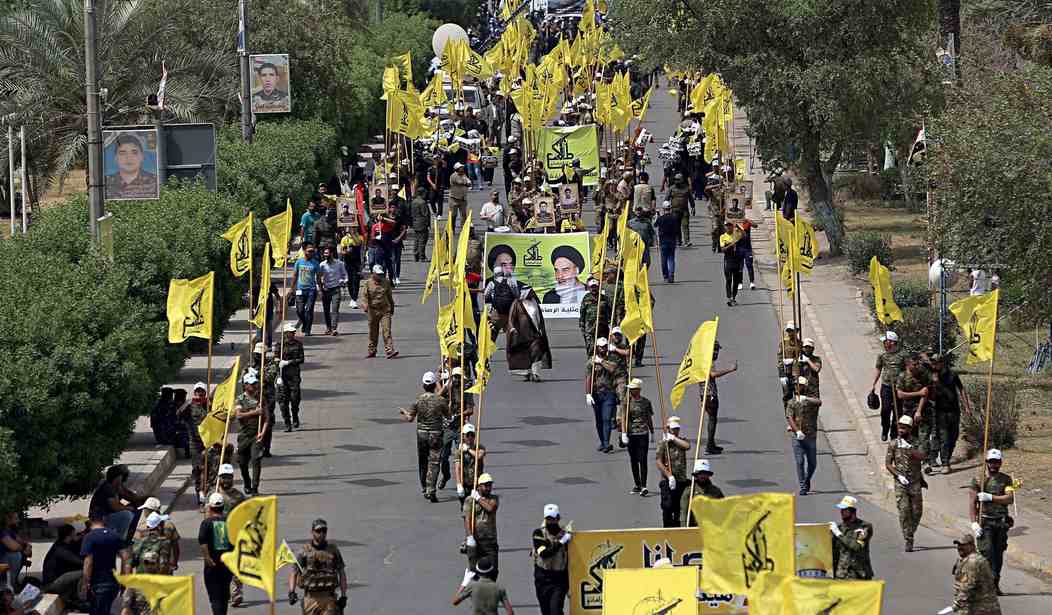The United States is currently at war. No, Congress hasn't declared war on anyone. The White House and the Pentagon have made no announcement.
There are no bands playing, soldiers marching, or pretty girls throwing flowers at the troops. Nonetheless, the U.S. is involved in a conflict that, unless it's managed smartly, could lead to a wider war with consequences almost too terrible to contemplate.
While Israel fights for its existence against Hamas and its backers in Iran, another war is raging against U.S. troops stationed in Iraq and elsewhere in the Middle East.
There have been at least 40 separate drone and rocket attacks against U.S. troops launched by pro-Iran militias from Syria and Iraq. Most of the missiles and drones have been destroyed by U.S. defenses, but several have broken through and hit U.S. troops stationed at bases in Iraq and Syria. There have been a few dozen minor injuries and some rattled nerves. But some U.S. commanders point out that we've been lucky so far.
Reuters reports on a failed drone attack where the weapon made it past U.S. air defenses and crashed into an army barracks near Erbil. If it had exploded, the death toll would have been grim. And since the drone was launched by an Iranian-backed militia, it's more than possible that the U.S. response would have been more severe than anything we've seen so far.
David Schenker, a former U.S. assistant secretary of state and a fellow at the Washington Institute for Near East Policy think-tank, says that despite the fact that neither the U.S. nor Iran wants a direct conflict, the possibility of a major strike that draws America into a conflict is "a very realistic concern."
"I think they are calibrating the attacks to harass rather than kill en masse U.S. troops," he said of Iraqi and Syrian militias. "But there's a lot more they can do."
For example, Hezbollah has several powerful anti-ship missiles it acquired from Russia. One or more of those aimed at U.S. ships that are part of the two-carrier strike group stationed in the Eastern Mediterranean would almost certainly widen the war.
At the moment, Hezbollah has no reason to open itself up to the power unleashed by two carrier strike groups. But the unpredictability of this war is what makes it so hazardous.
Secretary of State Antony Blinken was in Iraq last week trying to convince Iraqi Prime Minister Mohammed Shia Al-Sudani to rein in the Shi'ite militias responsible for the attacks on Americans. But Sudani has no more control over the militias than Blinken does. They take their orders from Tehran.
Yet Sudani has had little luck in persuading the militia groups from letting up their assault, or convincing their bankrollers in Iran to rein them in, according to five senior lawmakers in Sudani's governing coalition, a security adviser to the premier and a militia commander.
The prime minister and around 10 senior members of his government met with the commanders of about a dozen militia groups in Baghdad on Oct. 23 to press the groups to halt their attacks on U.S. forces, said the seven people, who were either present or were briefed on the meeting.
The plea largely fell on deaf ears, though, with most of the commanders vowing to keep up their assault until Israeli forces ended their siege and bombardment of the Gaza Strip, they added.
"No one — not the prime minister or anyone else — can stand against our religious duty," said Ali Turki, a Shi'ite lawmaker in the governing coalition as well as a commander with the powerful Iranian-backed Asaib Ahl al-Haq militia.
What do you suppose Iran is thinking when it sees Blinken spinning his wheels in Bagdhad pleading for Al-Sudani to sit on the militias?
Beyond sending air defenses like the Patriot system and a high-altitude system, the U.S. military is also taking additional steps to protect its tens of thousands of troops in the region, according to officials.
The measures include beefing up security at U.S. military bases in the region by increasing patrols, restricting access and boosting intelligence gathering, they said.
The response to the crisis from Biden, a Democrat, hasn't been strong enough for many of his critics, including Republicans in Congress.
"They are laughing at us in Tehran," said Republican Senator Tom Cotton, a member of the Senate Armed Services Committee. "Iran will continue to target Americans until President Biden gets serious about imposing severe costs on Iran."
Tehran is playing a dangerous game of "chicken" with the U.S. as it calibrates its provocations as far as it can go without drawing a serious U.S. response. The chances for a miscalculation by both sides grow as Biden, in the midst of a presidential campaign, tries to fashion a strong response without tipping into a general Middle East war.
Democrats are putting on a brave face, but I doubt they have any more confidence in Biden to get us out of this mess without a big war than we do.










